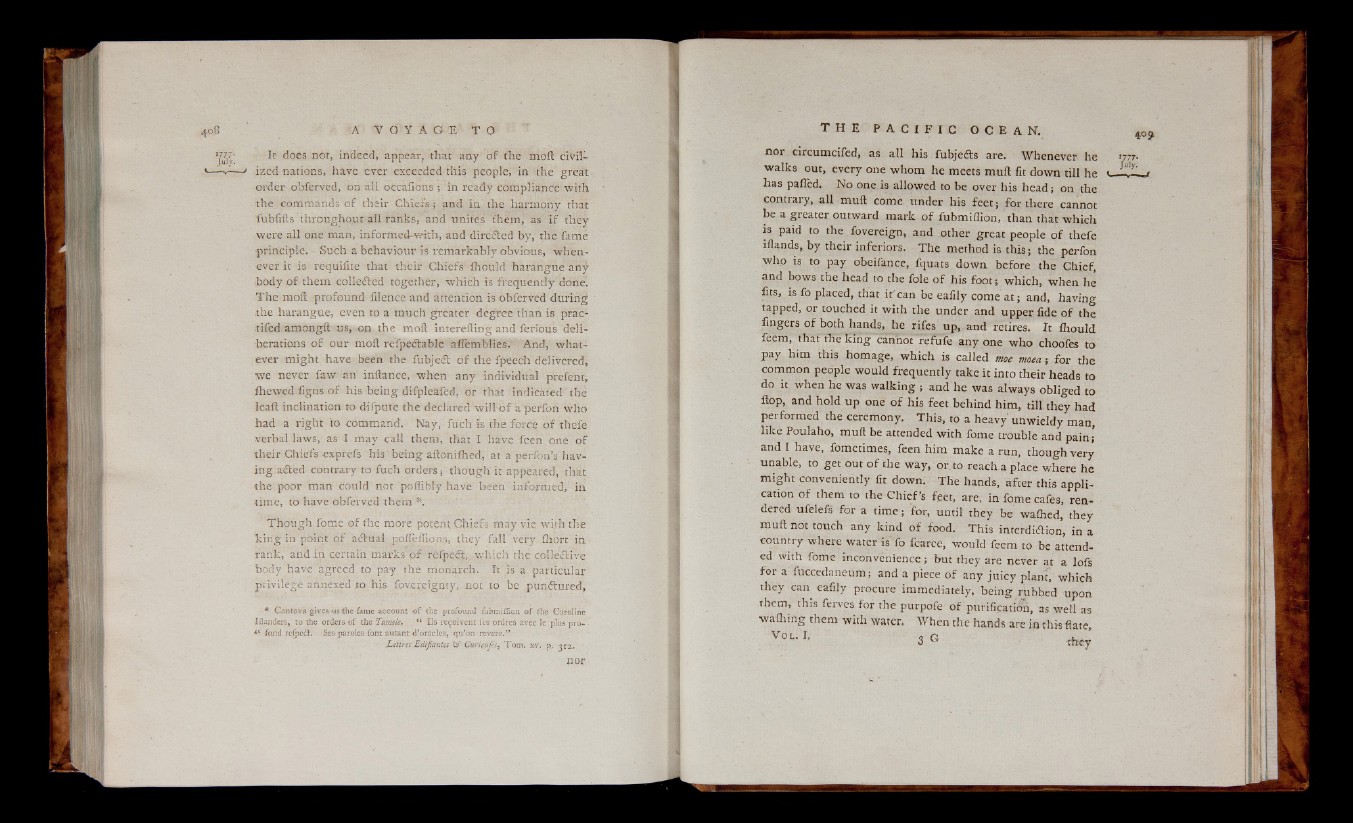
It does not, indeed, appear, that any of the moil civilized
nations, have ever exceeded this people, in the great
order obferved, on all occàfions ; in ready compliance with
the commands of their Chiefs | and in the harmony that
fubfîfts throughout ail ranks/arid unites them, as i f they
were all one man, informed-wfth, and diredled by, the fame
principle. Such a behaviour is remarkably obvious, whenever
it is requifite that their Chiefs fhould harangue any
body of them colleiled together, which is frequently done.
The moll profound filence and attention is obferved during
.the harangue, even to a much greater degree than is prac-
tifed amongll us, on the moll interefling and ferious deliberations
of our molt relpedlable aflemblies. And, whatever
might have been the fubjeél of the fptech delivered,
we never faw an inftance, when any individual prefent,
ihewed figns of his heing difpleafed, or that indicated the
lealt inclination to difpute the declared will of a perfon who
had a right to command. Nay, fuch is the force of thefe
verbal laws, as I may call them, that I have feen one of
their Chiefs exprefs his being alloniihed, at a perfon’s having
adled contrary to fuch orders ; though it appeared, that
the poor man could not poffibly have been informed, in
time, to have obferved them *.
Though fome of the more potent Chiefs may vie with the
king in point of adlual polTeflions, they fall very fhort in
rank, and.in certain marks of reipedl:, which the collective
body have agreed to pay the monarch. It is a particular
privilege annexed .to his fovereignty, not to he punctured,
* Cantova gives us the fame account of the profound’ fubmiffion of the Caroline
Iflanders, to the orders of the Tamole. “ Ils reçoivent ,fes ordres avec le plus pro- -
fond refpedl. .Ses paroles font autant d’oracles, qu’on revere.” -
Retires Edifiantes & Curieufesy Torn, xv. p. 312,
nor
nor circumcifed, as all his fuhjedls are. Whenever he 1777.
walks out, every one whom he meets mull fit down till he < -“1-‘ j ,
has palled. No one is allowed to be over his head ; on the
contrary, all mull come under his feet; for there cannot
be a greater outward mark of fubmiflion, than that which
is paid to the fovereign, and other great people of thefe
iilands, by their inferiors. The method is this ; the perfon
who is to pay obeifance, fquats down before the Chief,
and bows the head to the foie of his foot ; which, when he
fits, is fo placed, that i f can be eafily come at; and, having
tapped, or touched it with the under and upper fide of the
fingers of both hands, he rifes up, and retires. It fliould
feem, that the king cannot refufe any one who choofes to
pay him this homage, which is called moe moea ; for the
common people would frequently take it into their heads to
do it when he was walking ; and he was always obliged to
flop, and hold up one of his feet behind him, till they had
performed the ceremony. This, to a heavy'unwieldy man,
like Poulaho, mull be attended with fome trouble and pain;
and I have, fometimes, feen him make a run, though very
unable, to get out o f the way, or to reach a place where he
might conveniently fit down. The hands, after this application
of them to the Chief’s feet, are, in fome cafes, rendered
ufelefs for a time ; for, until they be waflhed, they
mull not touch any kind of food. This interdiction, in a
country where water is fo fcarce, would feem to be attended
with fome inconvenience ; but they are never at a lofs
for a fuccedaneum; and a piece of any juicy plant, which
they can eafily procure immediately, being rubbed upon
them, this ferves for the purpofe of purifipatihn, as well as
■waihing them with water. When the hands are in this flare,
L' 3 G > they